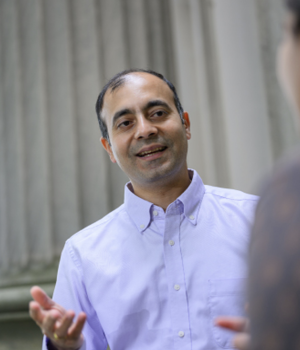
Rohit Karnik
he/him
Mechanical Engineering
Rooted in rigor, guided by care
Rohit Karnik is Abdul Latif Jameel Professor in the Department of Mechanical Engineering at MIT, where he leads the Microfluidics and Nanofluidics Research Group, and serves as Director of the Abdul Latif Jameel Water and Food Systems Lab (J-WAFS). His research explores the physics of micro- and nanofluidic flows and systems. Applications of his work include the development of water filters, portable diagnostic tools, and sensors for environmental monitoring.
To his students, Karnik stands out not only for his technical expertise, but also for his character. He exemplifies the qualities of a rigorous and ethical scientist and engineer, while also embodying humility and thoughtfulness as a person. It is this holistic approach to mentorship, both within engineering and in broader life contexts, that leaves a lasting impact.
Enthusiastic and accepting
Karnik is genuinely excited about his students’ ideas, and open to their various academic backgrounds. He validates students by respecting their research, encouraging them to pursue their interests, and showing enthusiasm for their exploration within mechanical engineering and beyond.
Always willing to meet students at their level of understanding, one student reflects on the manner in which Karnik helped them feel more confident in their academic journey. When one student from a non-engineering field joined the MechE grad program, Karnik never viewed their background as a barrier to success. The student shared, “From the start, he was enthusiastic about my interdisciplinarity and the perspective I could bring to the lab.”
He allowed the student to take remedial undergraduate classes to learn engineering basics, provided guidance on leveraging their previous academic background, and encouraged them to write grants and apply for fellowships that would support their interdisciplinary work. In addition to these concrete supports, Karnik also provided the student with the freedom to develop their own ideas, offering constructive, realistic feedback on what is attainable.
“This transition took time, and Karnik honored that, prioritizing my growth in a completely new field over getting quick results,” the nominator reflected. Ultimately, Karnik’s mentorship and patience, thoughtful encouragement, and emphasis of quality over quantity led the student to excel in the engineering field.
Supporting student success and growth
Karnik encourages his advisees to explore their interests in mechanical engineering and beyond. He emboldens them to apply for internships, travel overseas for field research, or even work towards a degree from another MIT department, regardless of his benefit.
This holistic approach extends beyond academics and into Karnik’s view of his students as whole individuals. One student shared that he treats them as complete humans — with ambitions, aspirations, and passions worthy of his respect and consideration — and remains truly selfless in his commitment to their growth and success.
Karnik emphasizes that ‘it’s important to have dreams,’ regularly encouraging his mentees to take advantage of opportunities that align with their goals and values. This sentiment is felt deeply by his students, with one nominator sharing that Karnik “encourag[ed] me to think broadly and holistically about my life, which has helped me structure and prioritize my time at MIT.”
Outside of the academic sphere, Karnik also regularly speaks about personal or other administrative issues with his mentees. One student remembers the support lent during a particularly challenging personal time towards the end of their PhD. They recalled that when struggling with productivity, Karnik responded with compassion and understanding rather than criticism.
“He reiterated the universality of going through ups and downs in life and encouraged me to reorient my balance between research demands and personal time to prevent burn out,” remembers the student. This dedication is particularly impressive considering Karnik’s role as Associate Department Head, a position that could take extra time away from his advising duties.
Overall, Karnik is deeply committed to his students’ academic, professional, and personal growth—always showing up with thoughtfulness, generosity, and unwavering support.
